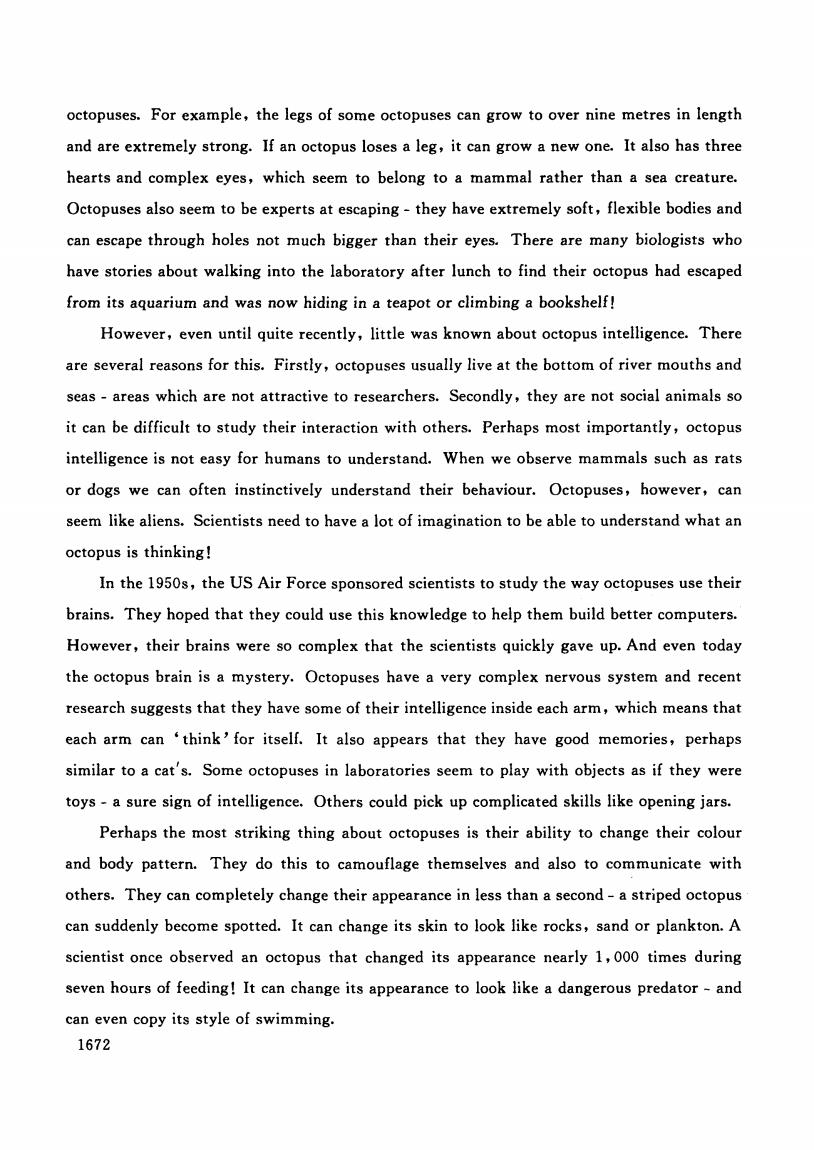正在加载图片...

octopuses.For example,the legs of some octopuses can grow to over nine metres in length and are extremely strong.If an octopus loses a leg,it can grow a new one.It also has three hearts and complex eyes,which seem to belong to a mammal rather than a sea creature. Octopuses also seem to be experts at escaping-they have extremely soft,flexible bodies and can escape through holes not much bigger than their eyes.There are many biologists who have stories about walking into the laboratory after lunch to find their octopus had escaped from its aquarium and was now hiding in a teapot or climbing a bookshelf! However,even until quite recently,little was known about octopus intelligence.There are several reasons for this.Firstly,octopuses usually live at the bottom of river mouths and seas-areas which are not attractive to researchers.Secondly,they are not social animals so it can be difficult to study their interaction with others.Perhaps most importantly,octopus intelligence is not easy for humans to understand.When we observe mammals such as rats or dogs we can often instinctively understand their behaviour.Octopuses,however,can seem like aliens.Scientists need to have a lot of imagination to be able to understand what an octopus is thinking! In the 1950s,the US Air Force sponsored scientists to study the way octopuses use their brains.They hoped that they could use this knowledge to help them build better computers. However,their brains were so complex that the scientists quickly gave up.And even today the octopus brain is a mystery.Octopuses have a very complex nervous system and recent research suggests that they have some of their intelligence inside each arm,which means that each arm can 'think'for itself.It also appears that they have good memories,perhaps similar to a cat's.Some octopuses in laboratories seem to play with objects as if they were toys-a sure sign of intelligence.Others could pick up complicated skills like opening jars. Perhaps the most striking thing about octopuses is their ability to change their colour and body pattern.They do this to camouflage themselves and also to communicate with others.They can completely change their appearance in less than a second-a striped octopus can suddenly become spotted.It can change its skin to look like rocks,sand or plankton.A scientist once observed an octopus that changed its appearance nearly 1,000 times during seven hours of feeding!It can change its appearance to look like a dangerous predator-and can even copy its style of swimming. 1672octopuses. For example , the legs of some octopuses can grow to over nine metres in length and are extremely strong. If an octopus loses a leg , it can grow a new one. It also has three hearts and complex eyes, which seem to belong to a mammal rather than a sea creature. Octopuses also seem to be experts at escaping - they have extremely soft , flexible bodies and can escape through holes not much bigger than their eyes. There are many biologists who have stories about walking into the laboratory after lunch to find their octopus had escaped from its aquarium and was now hiding in a teapot or climbing a bookshelf! However, even until quite recently , little was known about octopus intelligence. There are several reasons for this. Firstly, octopuses usually live at the bottom of river mouths and seas - areas which are not attractive to researchers. Secondly , they are not social animals so it can be difficult to study their interaction with others. Perhaps most importantly , octopus intelligence is not easy for humans to understand. When we observe mammals such as rats or dogs we can often instinctively understand their behaviour. Octopuses, however, can seem like aliens. Scientists need to have a lot of imagination to be able to understand what an octopus is thinking! In the 1950s, the US Air Force sponsored scientists to study the way octopuses use their brains. They hoped that they could use this knowledge to help them build better computers. However, their brains were so complex that the scientists quickly gave up. And even today the octopus brain is a mystery. Octopuses have a very complex nervous system and recent research suggests that they have some of their intelligence inside each arm , which means that each arm can ‘ t hink ' for itself. It also appears that they have good memories, perhaps similar to a cat's. Some octopuses in laboratories seem to play with objects as if they were toys - a sure sign of intelligence. Others could pick up complicated skills like opening jars. Perhaps the most striking thing about octopuses is their ability to change their colour and body pattern. They do this to camouflage themselves and also to communicate with others. They can completely change their appearance in less than a second - a striped octopus can suddenly become spotted. It can change its skin to look like rocks, sand or plankton. A scientist once observed an octopus that changed its appearance nearly 1 ,000 times during seven hours of feeding! It can change its appearance to look like a dangerous predator - and can even copy its style of swimming. 1672